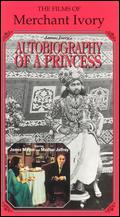
AUTOBIOGRAPHY OF A PRINCESS
UK, 1975, 59 minutes, Colour.
Jams Mason, Madhur Jaffrey, Keith Varneir, Diane Fletcher, Timothy Bateson.
Directed by James Ivory.
Autobiography of a Princess is an hour-long telemovie about the transition of India and its society from British rule to independence. It focuses on the daughter of a maharajah who has had to migrate to Britain and now lives in a flat in Kensington. Annually the tutor, Cyril Sahib, visits her and they reminisce about old times, look at home movies.
The film is nostalgic and critical about India's past, especially the ruling classes. The faded gentility of the princess and the tutor is satirised very gently as it is criticised.
Madhur Jaffrey who had appeared in such James Ivory films as Shakespeare Wallah is excellent as the princess. James Mason is also very effective as the tutor. There is some compassion in the film and it is a moving, brief look at India and its past.
1. The quality of this film? Its impact?
2. The career of the director James Ivory? An American, a filmmaker and interpreter of India in the 60s, making a film in Britain? Does this film reflect Ivory's background, insight?
3. The technical aspects of the film and their contribution to its success; the importance of the brevity, the use of colour, the confined structure and characters? The introduction of the home movies, the BBC interviews? The binding of all of these? The strength of the screenplay and its insight into character, into India, a changed world?
4. The blending of technique and content, a home movie autobiography? The type of audience response elicited by this style of film? The revelation of the princess, an afternoon visit from a friend, their chatting and watching of films over afternoon tea? Audience response to the intimacy of the film and its style?
5. The significance of the title? The life of the princess as seen by the audience, by the princess herself, by Cyril? The autobiography of her memories? The autobiography for the television audiences and their response to the interviews with the Indians? The biography as existing in the audience response to the film?
6. The focus on the princess and her status? The world of the India of the Maharajah? Long traditions, wealth, style, cast? A going back into an old world? The attention to detail of the occupations, recreations, wealth and luxury of the Maharaja and his court? The passing of this old world into a new world of British domination, British withdrawal, modern India? Industrialised India, egalitarian India? The new world of the legislation of 1972 and the exiles in India? The aftermath of such exile and the Indians' living in gentle seclusion in India? The princess and the irony of her Kensington flat exile? The princess and her status and memories as recorded in the home movies, as remembered by herself? The truth about the past? Her regrets, earnings?
7. The importance of the changes in society and attitudes in India? The manner of the Indian, Indian dress, language and its particular tone and intonation, the Indians and British influence? Being out of place in India, Britain and Empire and the passing of Empire? Old Britons and the contrast with the modern Britons and the BBC interviewing the Indians? What has this contrast of east and west, old and new, European and Asian to say about the modern world?
8. The portrait of the princess as a person, her style, her manner? Aristocracy and gentility? The importance of celebrating her father's birthday, the significance of her past relationship with him and its bond? The gentility of the afternoon tea party and its ritual? The annual watching of the films and revelling in the past, regretting the past? The added importance of the television interview? The significance of her discussions with Cyril? What did she see as the meaning to her life? What did the audience judge as to the meaning of her life?
9. The portrait of Cyril? James Mason portraying this character? As a Briton, as harking back to Victorian, Edwardian Empire attitude and style? His memories of the past, his work in the palace, his place with the Maharajah, his being ridiculed by the Maharajah? His focusing of his attention on a book that is never being written? The irony of the subject of the book and his ideal for modern India? Regrets for a way of life that is gone, his apartment and home, his participating in the ritual, his reaction to the films, to the BBC interview? As an example and symbol of the old Britain that was gone? What did he see as the waning to his life? Failure? His isolation, undertones of homosexuality? Sense of failure?
10. How did the home movies visualise the realities of the Maharajah's court; the blood sports, mindless practical jokes and debaucheries? The ugliness? The disastrously arranged marriage to an opium addict and its repercussions on her? Her father's behaviour and indiscretions? The past and its ugliness contrasting with the drab state of the present?
11. The significance of adding the BBC reviews? The attitudes of the people interviewed and the significance of their regrets? Their future?
12. The significance of the indiscretion of the Maharajah, the effect on himself, his daughter, on Cyril? Was it appropriate that this should have been visualised? The blackmail? The earthy reality of the Maharajah's experience?
13. How do the strands come together in the princess' final film? The hero of Cyril's book who went around India building schools, wells, listening to the songs and stories of the villages and was not welcome at the Maharaja's court? The woman singing, old, abstracted from the ugliness of the realities around her? The pathos and irony of this ending? The princess then waiting until next year? Cyril going how?
14. How much did the film contribute to the understanding of culture, history, society, change, morals and values, appearances and reality?